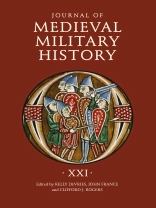‘The leading academic vehicle for scholarly publication in the field of medieval warfare.’ Medieval Warfare
The twenty-first volume of the
Journal of Medieval Military History begins with three studies examining aspects of warfare in the Latin East: an archaeological report on the defenses of Jerusalem by Shimon Gibson and Rafael Y. Lewis; a study of how military victories and defeats (viewed through the lens of carefully shaped reporting) affected the reputation, and the flow of funds and recruits to, the Military Orders, by Nicolas Morton; and an exploration of how the Kingdom of Jerusalem quickly recovered its military strength after the disaster of Hattin by Stephen Donnachie. Turning to the other side of the Mediterranean, Donald J. Kagay analyzes how Jaime I of Aragon worked to control violence within his realms by limiting both castle construction and the use of mechanical artillery. Guilhem Pépin also addresses the limitation of violence, using new documents to show that the Black Prince’s sack of Limoges in 1370 was not the unrestrained bloodbath described by Froissart. The remaining three contributions deal with aspects of open battle. Michael John Harbinson offers a large-scale study of when and why late-medieval men-at-arms chose to dismount and fight on foot instead of acting tactically as cavalry. Laurence W. Marvin reconsiders the Battle of Bouvines, concluding that it was far from being a ritualized mass duel. Finally, Michael Livingston elucidates some principles for understanding medieval battles in general, and the battle of Agincourt in particular.
Cuprins
List of Illustrations
List of Contributors
1.Shimon Gibson and Rafael Y. Lewis. Capturing Jerusalem: the Fāṭimid/Seljȗk, Crusader, and Ayyȗbid Fortifications, Ditches, and Military Outworks of the City
2.Nicholas Morton. The Impact of Victory and Defeat on the Military Orders’ Public Image
3.Stephen Donnachie. From Hattin to La Forbie: The Military Resources and Strategy of the Latin Kingdom of Jerusalem, 1187-1244
4.Laurence W. Marvin. Philip II’s ‘Eye of Command’ and the Battle of Bouvines
5.Donald J. Kagay. One Monarch’s Ban on Illegal Artillery and Castle Use in the Medieval Crown of Aragon and A Slowly Changing Royal Prerogative
6.Guilhem Pépin. The Sack of the ‘City’ of Limoges (1370) Reconsidered in the Light of an Unknown Letter of the Black Prince
7.Michael John Harbinson. To Fight on Horse or Foot? Dismounting in the Age of Chivalry
8.Michael Livingston. A Battle Is Its Ground: Conflict Analysis and a Case Study of Agincourt, 1415
Despre autor
CLIFFORD J. ROGERS is a Professor of History at the United States Military Academy and founding director of the West Point Digital History Centre. His many books and articles on medieval warfare have been recognized with awards from the Royal Historical Society’s Alexander Prize to the Society for Military History’s Distinguished Book Award and Moncado Prize, as well as two Verbruggen Prizes and the Bachrach Medal from De Re Militari. His recent work has focused on early gunpowder and gunpowder artillery.












